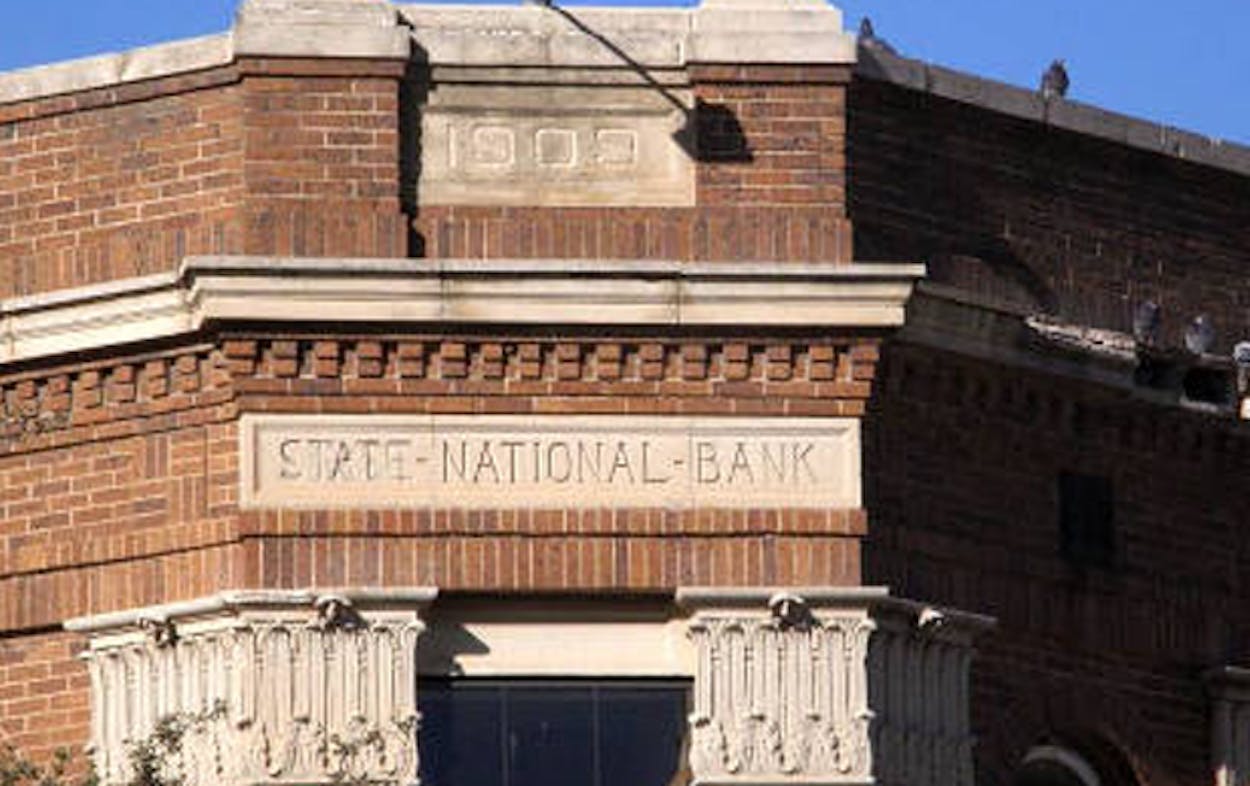The Texas economy is one of the most robust in the world. Wildly profitable companies and ingenious entrepreneurs call this state home, and what happens here influences businesses around the nation. Here’s a slice of the profits, losses, big deals, and backroom decisions happening across
Dodd Forsaken
An article in this week’s issue of the Economist tells the story of Texas’s 177th-largest bank and its crusade against federal finance regulations.
The State National Bank of Big Spring is challenging the controversial Dodd-Frank Act, which was introduced two years ago as a protection against predatory lending practices that led to the financial crisis of 2008. Large banks largely oppose the policy, but as the article reports, they tend to shy away from publicly criticizing it “out of fear that it could prompt retribution by regulators.”
However, the small bank in Big Spring has stepped forward to argue that Dodd-Frank is unconstitutional. In a lawsuit that may go all the way to the U.S. Supreme Court, the bank contends that the act disproportionately threatens the business models of smaller institutions.
The Bottom Line: The article reports that although “the bank has not repossessed a home in seven years or cost taxpayers a penny,” it has stopped issuing mortgages due to Dodd-Frank regulations. As a result, its owners worry that “some good customers will go to the giant, government-backed banks, and some poorer customers may not get credit at all.”
A HOU Divided
San Antonio, Houston and Dallas are the three most economically segregated cities in the nation, according to a report released this week by the Pew Research Center. The study examined the concentration of wealthy residents who live in majority upper-income areas and that of poor residents living in predominantly lower-income areas. Researchers found that residents of Texas’ largest cities are segregated into rich and poor clusters rather than living in the same communities.
The statewide population boom over the last several decades is partly to blame for the trend, the study says, because affluent families fled to the suburbs as lower-income residents and immigrants gravitated toward the urban cores.
The report also attributes the trend to “the long-term rise in income inequality” in the U.S., the Houston Chronicle reports.
The Bottom Line: While the trend in Texas and the Southwest is shifting toward economic segregation, the report also finds that the middle class still has a foothold on the national scale: “Three-quarters of Americans still live in neighborhoods where a majority of residents fall into the middle-income category,” according to the Chronicle.
Steal of a Deal?
A Dallas marketing firm is squaring off against Groupon in a patent infringement lawsuit. Blue Calypso Inc. claims that the online coupon dealer “infringed on two of its patents that cover a system for peer-to-peer advertising,” according to the Dallas Business Journal.
Bill Ogle, who took over as Blue Calypso’s CEO in June, says the firm is protecting its technology, which helps companies “monetize their social media connections.”
The Bottom Line: TechCrunch reports reports that several other companies have targeted Groupon in patent cases, including a suit last year accusing the company of infringing on patented mobile services including “location-based offers and group selling over wireless networks.”
Book ’Em
Steven Bercu, CEO and co-owner of the Austin bookseller BookPeople, testified before the Senate Commerce Committee in Washington on Wednesday, arguing in favor of a proposed measure that would require large online retailers to pay sales taxes on purchases made outside their home states.
As it is now, online sellers are able to “undercut traditional retailers by 6 to 10 percent,” causing states to miss out on billions in sales tax revenue, the Austin Business Journal reports.
Companies ranging from independents like BookPeople to behemoths such as Amazon largely support the Marketplace Fairness Act because it would level the playing field for all sellers, according to EcommerceBytes, an industry news site. Forbes notes that while Amazon seems like an unlikely supporter, the company is “helping itself by making sure its competitors have to pay tax, too.”
The Bottom Line: The bill includes an exemption for businesses that generate less than $500,000 in annual online sales, a group that includes BookPeople. However, Bercu says his company already voluntarily uses software to pay sales taxes to states where its online customers reside.
Winner of the Week: Belo
Dallas-based television broadcaster Belo Corp. profited from a political advertising arms race associated with the U.S. Senate campaign in May, recording a 43 percent jump in profits for the second quarter. Businessweek reports the company’s net income was $25.9 million, compared with $18.1 million in that period last year.
Political ads were clearly a driver of Belo’s success, generating $9.5 million—up from last year’s $1.2 million. The company reported that the campaigns continued buying ads well into July leading up to this week’s Republican primary runoff, which bodes well for its third quarter outlook.






